A few months ago, the Jimquisition had an episode about gamers criticizing game reviews and reviewers for "not finishing the game". James/Stephanie Sterling correctly points out that this complaint with a game review is most often employed to deflect from valid criticism of a game -- usually because the person complaining likes the game and gets overly defensive in response to any criticism. While I agree with James/Stephanie Sterling's response in the original video, I also have strong feelings about other practical concerns regarding whether a video game reviewer should need to finish a game in order to review it. As an amateur game critic and YouTube essayist, this particular brand of attack against reviews and reviewers is relevant to me, my gaming habits, and my content creation, so I hope that I have a worthwhile perspective about this topic.
This essay was inspired by a recent episode of The Jimquisition.
As for the underlying issue of whether a game reviewer should have to finish a game before reviewing it: the answer to that question is a resounding, absolute, unequivocal "no".
As an amateur, who plays games and creates written reviews and video essays, all on my free time, outside of a full-time job, I cannot play every game to end credits -- let alone to 100% completion or a Platinum Trophy.
And you know what? Neither do most players.
This essay is available in video format on YouTube.
Go ahead, take a look at the achievement or trophy metrics for any game you play. You'll probably find that the achievement for beating almost any game will be owned by well below half of all players, and might actually be less than a quarter of players for many longer games like RPGs. And while there are certainly some players who play offline and don't report their stats to Steam, Microsoft, Sony, or Nintendo, the achievement stats for the vast, overwhelming majority of games is very closely representative of the population, since most players don't go to the trouble of playing "off the grid".
Finishing a game is a relatively rare thing for the average gamer to do, which means the average gamer isn't going to care if a particular review finished the game or not. That average gamer is probably not going to see the end of the game anyway, so a review that only covers the first half or so of the game will still be perfectly adequate and informative for such a player.
Most games are completed by well under than half of all players.

So as an "average gamer" who plays as a hobby and writes reviews and other content on the side, as an un-paid amateur, not finishing a game is good enough for me too. Yes, I will try to finish the main campaign of a game that I review, if it's possible and practical. For most shorter games (with campaigns less than 20 hours), I do, indeed, almost always hit the end credits before I publish a review. It will usually take me a few weeks to do it, which is why, even if I bought the game on release day, my reviews will still be several weeks late, or longer. Most of my reviews are practically retro reviews by the time I get them out.
[More]
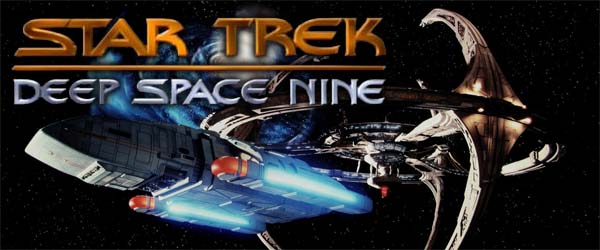
After posting 2 essays about how Deep Space Nine realizes the ideals of Star Trek and how it was ahead of its time, I would feel remiss if I concluded any discussion of the greatness of Star Trek Deep Space Nine without praising its outstanding cast of recurring guest actors and characters. Seriously, DS9's recurring guest characters are some of the true highlights of the entire show. Their natural charisma as performers is bolstered by the show's fundamental structure as a serialized story, and its setting on a stationary outpost. These two decisions in the design and production of the show allow guest characters to recur frequently, with their own storylines and arcs, and helps make them just as vital to the plot of the show as any of the main cast.
As mentioned previously, Deep Space Nine wasn't a starship like the Enterprise. It didn't have the luxury of sailing off into the sunset at the conclusion of every episode, leaving the people and problems of the episode behind. The crew of Deep Space Nine were stuck dealing with the long-term fallout of the events of any particular episode, and that included the circumstances of characters in the station's immediate neighborhood. Some of these characters come and go, leaving Deep Space Nine behind forever. But others become permanent fixtures on the show, almost as much a part of the main cast as Armin Shimerman or Andrew Robinson.
Being a stationary starbase, a diverse collection of guest characters repeatedly visit Deep Space 9.
The following post will discuss specific plot points regarding multiple guest characters, including some who don't appear until the later seasons of the series. As such, this post will have the most explicit story spoilers of any of these 3 Deep Space Nine retrospectives. Read on at your own risk.
Star Trek's best villain(s)
The highlight of Deep Space Nine's guest cast is its principle villain, the best villain in all of Star Trek: Gul Dukat.
Yes, you read that right. Dukat is Trek's best bad guy.
Dukat is better than Khan. Better than General Chang (but only barely). Better than the Borg (and their stupid queen). Certainly better than the Duras Sisters or any of Trek's rogues gallery of throwaway villains like Commander Kruge. He's better even than Q -- if you want to consider Q a "villain" to begin with.
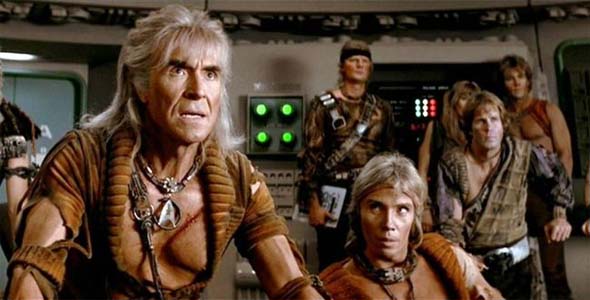 - Star Trek II: The Wrath of Khan, copyright Paramount Pictures.
- Star Trek II: The Wrath of Khan, copyright Paramount Pictures.
Sorry Khan, I do not think you are Star Trek's best villain. You're 2nd place, at best.
Yes, Dukat is my favorite Trek villain -- by a long shot. It's not even close. [More]
a258d721-4fc4-450e-b1ec-e89bbfc5cfb3|0|.0
Tags:Star Trek, Star Trek: Deep Space Nine, Deep Space Nine, space station, demagogue, Quark, Armin Shimerman, Garak, Andrew Robinson, Gul Dukat, Marc Alaimo, Kai Winn, Louise Fletcher, Weyoun, Grand Liquidator Brunt, Shran, Jeffrey Combs, Rom, Max Grodénchik, Nog, Aron Eisenberg, Grand Nagus Zek, Wallace Shawn, Ishka, Moogie, General Martok, J.G. Hertzler, Ziyal, Damar, Michael Eddington, Kenneth Marshall, Agent Sloan, Section 31, Vic Fontaine, Ezri Dax, Nicole de Boer

In the age of streaming and binge-watching here in the year 2023, long-form serialized television is now ubiquitous. Every network and streaming service has wanted its own blockbuster TV shows. Whether it's AMC's The Walking Dead and Breaking Bad, HBO's Game of Thrones, Sci-Fi's Battlestar Galactica, Netflix's House of Cards and Stranger Things, History's Vikings, and so forth, it seems that every big new show outside of sit-coms has a heavily-serialized format. Procedural dramas are going the way of the dinosaur.
Serialized, long-form television may be commonplace now, but back in the 1990's, it was virtually unheard of outside of daytime soap operas (such as Dallas and Dynasty) and the occasional network mini-series. At least, this was the case in the United States. British television has a much longer track record of serialized story-telling. A big part of why serialized television was uncommon was that the producer(s) of network syndicacted shows didn't have as much control over when its affiliates decided to air the shows, or how heavily they would market and advertise it. Furthermore, the networks or affiliates could change the time slot of the show pretty much at a whim. Viewership, therefore, would be much more fickle and fractured. Audiences would pop in and drop out. Expecting the audience to have seen every previous episode in preparation for this week's episode was a dangerous and risky expectation for a production studio. It's easy to lose viewers if none of them know what's going on.
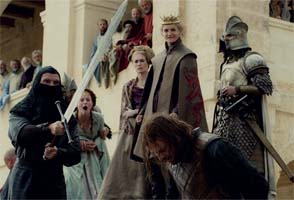 - Game Of Thrones, copyright HBO
- Game Of Thrones, copyright HBO
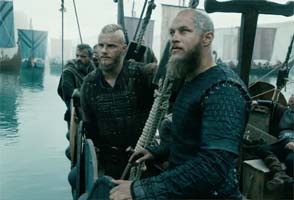 - Vikings, copyright History Channel
- Vikings, copyright History Channel
Highly serialized, long-form drama are the norm for modern networks and subscription television services.
As I mentioned in the previous essay, this was the case with me. I was in elementary school and middle school during DS9's run, and I missed a lot of episodes in the first couple seasons, despite wanting to watch the show. Missing so many episodes meant that I had very little idea what was going on when I would watch, and so I mostly lost interest in the show. If my dad was watching it, and I was there, I'd watch it, but I wasn't planning my day around it.
Looking back now, that sort of serialized story-telling is now ubiquitous and expected, and so it's easier to recognize that Deep Space Nine was truly innovative and ahead of its time in this regard.
Long-form story-telling
Serialized story-telling wasn't alien to Star Trek. Deep Space Nine premiered in 1993, the same year as the sixth season of Next Generation. By this time, The Next Generation had several story threads that had recurred over the course of a season, or over multiple seasons -- as well as several attempted overarching plot threads that were dropped.
As early as the first season of Next Generation, Q had become a recurring antagonist, and his "judgement" over the human race was established as a recurring plot thread. Heck Q's judgement of humanity was originally depicted as the framing mechanism for the entire show! It was scaled back in the following seasons due to the general poor reception of the first season, and the fact that John de Lancie just works better in a more whimsical and comic role.
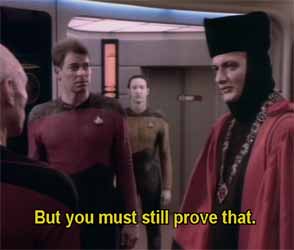 - TNG "Encounter At Farpoint", season 1, episode 1
- TNG "Encounter At Farpoint", season 1, episode 1
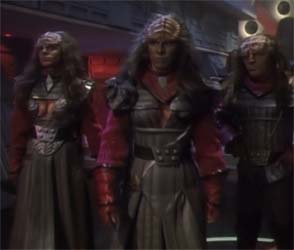 - TNG "Redemption, Part I", season 4, episode 26
- TNG "Redemption, Part I", season 4, episode 26
TNG had several recurring plot threads.
The final two episodes of Next Generation's first season, "Conspiracy" and "The Neutral Zone", seem to have been part of an abandoned attempt at more long-form story-telling. Both seem to be trying to establish some new threat to the Federation (and possibly a shared threat between the Federation and other rival powers such as the Romulans). I think the original idea was for this to become an overarching storyline for the entire series. But the thread from "Conspiracy" was completely dropped, and the destroyed colonies referenced in "The Neutral Zone" were re-written to be retroactive foreshadowing of the Borg's appearance in season 2.
[More]
cddb26c9-ca5a-4327-b199-d0d00dec522b|0|.0
Tags:Star Trek, Star Trek: Deep Space Nine, Federation, Starfleet, progressivism, humanism, secularism, religion, fundamentalism, fascism, terrorism, war, trans-gender, Worf, Odo, Quark, Moogie, Ishka, Bajor, Dominion, Founder, Changeling, Jem'Hadar, Cardassian, streaming television, Game of Thrones, Battlestar Galactica, the X-Files, Babylon 5, Buffy the Vampire Slayer, The Sopranos, Lost, Twin Peaks

The Next Generation, Deep Space Nine, and (depending on who you talk to) Voyager are widely regarded as the "Golden Age" of Star Trek. Since many Trekkies look back at this time period of the late 80's and 90's with the rose-tinted glasses of nostalgia, it might surprise you to read that Deep Space Nine used to be a highly divisive topic among Star Trek fans. Even to this day, I've talked to "hardcore" Trek purists who dislike Deep Space Nine because of how dark and conflict-driven the series is. I can't imagine what these people must think of the Kelvin-verse reboots, Star Trek: Discovery, or Picard. If you think I'm hard on those recent iterations of Star Trek, then you should talk to these people!
In any case, the idea that DS9 is too dark and conflict-driven is a valid criticism from someone coming from the perspective of a fan of The Original Series and Next Generation. Both of those shows were about an idealistic future in which humanity had grown out of its petty squabbles and now seeks to better itself through cooperative exploration and colonization of space. Deep Space Nine didn't quite accept those ideas at face-value. Deep Space Nine's more pragmatic approach had some fans believing that Deep Space Nine violated the spirit of Star Trek.
Many fans of The Original Series and Next Generation criticized Deep Space 9 for being "too dark".
Deep Space Nine was also the first Trek series to be highly serialized, having a singular, overarching plot throughout most of the series, and with frequent mini-arcs running for half a season or a whole season. TNG had its share of recurrent story arcs. Q's "trial of humanity" was pitched as a framing mechanism for the entire show, but ended up only serving to bookend the series, while relegating most of Q's appearances each season as comic tangents. There were other recurrent sub-plots as well, such as Worf's discommendation from the Klingon Empire and his conflict with the Duras House in the "Sins of the Father" arc, the Borg story thread, Data's relationship with his brother Lore, Wesley's training as a Starfleet officer, and a few others. But TNG stayed mostly episodic. Almost all the single episodes of TNG (and the two-parters as a whole) can be enjoyed independently, without having seen any previous episodes of TNG. That was not the case with DS9.
I missed many episodes of DS9 because
it aired on weekend evenings.
DS9 was on the air throughout my elementary school and middle school years (I was seven when the show premiered). It frequently aired (syndicated on Fox in my region) on weekend evenings, and I was often outside playing tag, riding bikes, or playing touch football or street basketball with neighbor kids. As such, I missed a lot of episodes. Due to the highly-serialized nature of the show, when I would see an episode, I would have no idea what was going on! Because I rarely watched the show, and didn't understand it when I did see it, I didn't particularly like it. I'd still watch it, because it was still Star Trek. In fact, Voyager was the first Star Trek series that I watched regularly (it being on Wednesday nights, when I wasn't outside playing), and, well, you all know how I feel about Voyager.
In fact, I grew up with a bit of a preconceived notion that Deep Space Nine was the "bad" Star Trek series -- even though critics at the time largely appreciated it. On the off chance that I could talk about Star Trek with a peer, they generally didn't like DS9 either -- for many of the same reasons.
It wasn't until my college years, when the show was released for sale on DVD that I sat down and watched the whole series from start to finish. At first, I wasn't even sure if I wanted to bother buying the DVDs. After all, DS9 was "the bad Star Trek". So why spend the money? And those DVDs cost a lot of money! CBS wanted something like $120 for a single season, compared to $30 or $40 a season for shows like E.R. or Grey's Anatomy. At least the Next Gen DVDs came in fancy, sturdy boxes. The DS9 DVDs came in cheap, flimsy, rigid plastic booklets that start to fall apart as soon as you open them. I think my mom bought them from Costco for $90 a pop -- a considerable discount, but still obnoxiously expensive!
CBS wanted $120 per season for DS9 DVDs!
I was now older. I was coming to terms with my personal identity as a progressive secular humanist. Most importantly, I could finally follow along with the various multi-episode story threads and the complex, nuanced characterizations. And boy, did my opinions on the series change!
I'll always have a soft spot for Next Generation. That show has my favorite Trek character: Data. And Picard is probably my third favorite character after Spock. After my single favorite episode of Trek, the Original Series' "Balance of Terror", most of my runner-up favorite episodes are TNG episodes. Episodes like "The Measure of a Man", "Who Watches the Watchers", "The Offspring", "The Best of Both Worlds", "Deja Q", "I, Borg", "Tapestry", "The Inner Light", "Darmok", "All Good Things...", and so on...
Despite my fondness for Next Generation, I actually think that Deep Space Nine is the better all-around show.
Every Trek series since the original has taken a couple years to really find its footing. TNG doesn't really figure itself out until midway through season 2, and Voyager takes until the 4th season to figure itself out -- if ever. I don't know if Discovery ever righted its ship, since I didn't bother to watch past the first season, and Picard didn't even become watchable until the third season. I feel like DS9 finds its footing much earlier than TNG or Voyager. Deep Space Nine's characters, themes, and stories start to fall in place by the end of season 1. In fact, one of my favorite episodes of the entire series (and one of my favorite episodes of Trek in general) is a season 1 episode: "Duet". DS9 is the only Trek series (since the original) for which one of my favorite episodes comes as early as the first season.
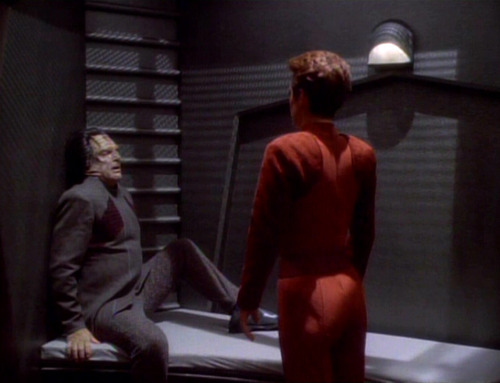 - DS9 "Duet", season 1, episode 19
- DS9 "Duet", season 1, episode 19
One of my favorite DS9 episodes (and Trek episodes in general) is the season 1 Holocaust allegory, "Duet".
The last episode of season 1, "In the Hands of the Prophets" starts to set up the season-long arcs (and a series-long arc) that would become a trademark of the series. That episode introduces us to recurring villain Vedek Winn and starts the process of her gradual accumulation of power, which we'll talk about later.
But despite the series coming together better in the first season, critics of Deep Space Nine aren't wrong when they say that it "feels different" from the Original Series or Next Generation. The show is unarguably darker and more conflict-driven. The entire second half of the series is about an interstellar war, and the seasons leading up to that repeatedly tell stories about domestic terrorism, Holocaust allegories, religious persecution, and cynical politics. These sorts of themes were present in episodes of TOS and TNG here and there, but DS9, at a fundamental level, was about these difficult topics.
[More]
79b833d8-97bd-4e2f-b45e-9f666db1588a|1|5.0
Tags:Star Trek, Star Trek: Deep Space Nine, Gene Roddenberry, Federation, Starfleet, culture, ideals, cooperation, socialism, post-scarcity economics, alien, multi-culturalism, progressivism, humanism, secularism, terrorism, war, Benjamin Sisko, Kasidy Yates, Odo, Quark, Ferengi, Klingon, Cardassian, Dominion, Bajor
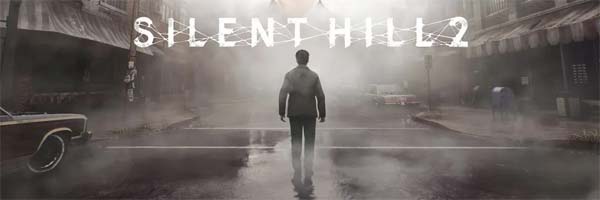
By the time you read this, the remake of Silent Hill 2, being developed by Bloober, is less than 2 months from its expected release. So nothing I write here can possibly change the game. But there has been something that has been nagging at the back of my brain ever since the first trailer for the remake released. Since most of the concern about Bloober's Silent Hill 2 is focused on their historically awful depictions of mental health and trauma, I haven't seen a whole lot of content addressed at this particular concern of mine. So I thought I'd share my thoughts.
First and foremost, I will be discussing the story and ending of the original Silent Hill 2, as well as speculation regarding whether Bloober will change this ending, or somehow botch its execution. As far as I'm concerned, the announcement trailer has already shown that it will be one or the other: a changed ending, or a botched ending. But in any case, if you haven't played Silent Hill 2 before and don't want to be spoiled, then don't read this post. You've been warned.
The announcement trailer for Silent Hill 2: Remake.
Before moving on, feel free to check out the announcement trailer in its entirety, above. You can also watch this complete analysis in video essay format on YouTube.
This entire analysis is also available in video essay format on YouTube.
The original opening
For anyone still here after the spoiler warning, let's talk a little bit about the opening scene of Silent Hill 2, how it relates to the game's ending(s), how this same scene is depicted in the remake trailer, and what the changes to that scene mean for the ending. Silent Hill 2 opens as such:
A mostly calm and collected James Sunderland stares at himself in a dirty bathroom mirror, taking a deep breath, and then walking out to a scenic overlook to explain the premise of the game. He got a letter from his wife, who died of a terminal illness 3 years ago. The letter says that she's alive and waiting for him in Silent Hill. He knows it can't possibly be true, but if there's any chance that she is somehow still alive, he has to know.
This opening shows us a James who is supposedly 3 years removed from the death of his wife. He isn't necessarily grieving any more, but doesn't seem to have completely moved on; otherwise, why be here? Regardless, he is completely surprised by this letter and in disbelief. This is a subtle, subdued opening that gives the player little reason not to take this all at face value. And it goes on to follow this up with a slow-burn opening act to the game, in which James strolls casually through a wooded path along the lake and doesn't encounter anything overtly scary or threatening for a good 20 or 30 minutes, depending on the pace that the player is going.
The original is subdued and gives little reason to not take the premise at face value.
This puts the player in the same headspace as James. We are just as confused, surprised, and curious as him, but with that nagging certainty that all must not be as it seems. This allows the player to role play as James in good faith and sets up the game's eventual twist, and also sets a relatively clean slate for the various ending triggers. The player doesn't see James as anything other than a confused husband, desperately hoping to see his possibly-not-dead wife again. The player is able to play James as such, and how you role play as James will inform how he eventually deals with the game's twist revelation. But the game will be slowly pulling the rug out from under James and the player over the course of the game, gradually establishing him as an un-reliable narrator.
Considering the additional context that this is a sequel to Silent Hill (which was about a father trying to rescue his daughter from a demonic cult), players may have had even less reason to not trust James. They have no clue that this game is going to deviate from the first game's premise and be an introspective and metaphorical tale that is almost completely divorced from the first game's plot. They just know it has the number 2 in the title, so it probably follows from the story of its predecessor. Maybe Mary really is alive? Maybe she's another vessel for the cult's demon god? Or maybe her soul was also split and there's a psychic Mary doppelganger living in Silent Hill who is summoning James to help her stop the cult's plans? Or maybe that doppelganger wants to trick him into helping the cult? And hey, guess what? A few hours into the game, we do indeed meet a Mary doppelganger!
Based on the opening minutes of the game, Silent Hill 2 can go in a lot of potential different directions, either introspective, supernatural, cult-driven, or any combination thereof.
[More]
|

| 12 | | | | | | | 60 | | 11 | | | | | | | 55 | | 10 | | | | | | | 50 | | 09 | | | | | | | 45 | | 08 | | | | | | | 40 | | 07 | | | | | | | 35 | | 06 | | | | | | | 30 | | 05 | | | | | | | 25 | | 04 | | | | | | | 20 | | 03 | | | | | | | 15 | | 02 | | | | | | | 10 | | 01 | | | | | | | 05 |
|